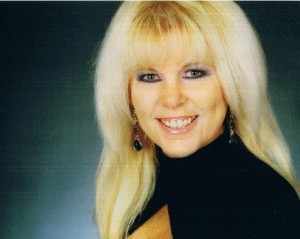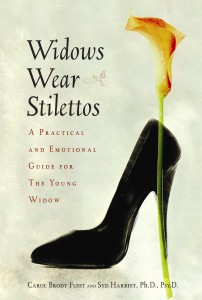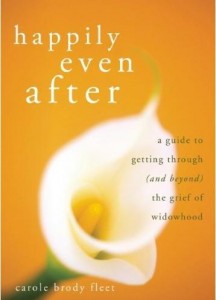Carole Brody Fleet is the founder and CEO of Widows Wear Stilettos, Inc. as well as the author of Widows Wear Stilettos: A Practical and Emotional Guide for the Young Widow and the upcoming Happily EVEN After: A Guide to Getting Through (and Beyond!) the Grief of Widowhood.
Kelly: First of all, can you tell us a little bit about what Widows Wear Stilettos does, and what its goals are?
Carole: It all started out as one book. I like to be very honest about that. It took on a life of its own. Its goal is to create a community among widows, regardless of age, gender, etc. We’ve got members as young as 17 and going up into their late 80s. We have no boundaries at all. We seek to do many different things. We don’t want anyone to suffer. We want them to know there’s support. We just want to reach out and take hold of hands that are in need of that. We are also thrilled to be partners with the Soaring Spirits Loss Foundation to offer the Camp Widow program. Starting this year we’ll be doing it twice a year. Its primary goal is to help widows find support.
Kelly: Your second book is set for release in May of this year, and you’ve also got a CD out. How did those things come about?
Carole: The book came first at about 2 in the morning in 2005. I thought, “You know what? My daughter and I have really made it through the storm pretty well.” I had made most of the transitions that most people make. So I started making notes on a legal pad. What I came up with was a table of contents. I’ve got some wonderful widow books and grief books, but the problem for me is that they only seem to focus on grief. I really didn’t need instruction on grief. I didn’t want to just focus on grief. My first book started talking about things that other books weren’t talking about. Once we went online in 2006, we started getting emails immediately. We still to this day get thousands of emails a month. I needed to get something out there faster than a book; that’s how the CD came about. It’s kind of like a companion to the book. Everybody assumes it’s an audio book, but it’s filled with other issues.
The other book is coming out in May. And the second book actually was written in large part by the widow community. It consists of questions and answers. All of the questions are written by widows and the answers are my actual answers along with additional commentary. They range from financial to childrearing questions. There are scenarios you wouldn’t even think about. We talk about dating again, falling in love again, and all kinds of things that widows are asking from the very common to the not so common.
Kelly: Your new book is incredibly comprehensive; did you have to do quite a bit of research about grief and death, or is the advice more from your own personal experience?
Carole: It all came from our community. When I started, the idea came from my agent, I’ll be honest, but my agent said, “That’s your next book,” when I told him about all the letters I was getting. We had gotten thousands of letters from people. And one letter could ask 3 or more questions, so it took about a year to read through all of them. I decided which questions I saw most often. I thought about what the most common issues are I’ve seen in the community as an expert, and what I’ve gone through as well. I thought about what the most common mistakes made in the healing journey are. I like to provide wake-up calls, and I do that by providing examples of horrendous situations. I let people know that there are other people suffering just as much, if not more, like the widow who finds out her husband is dead from a mistress, and so on. These are horrendous situations, and while they don’t happen very often, they’re important. First of all, nobody should feel alone. These women in horrible situations feel completely alone. But then it gives other people a way to see that, yes they’ve been through a rough time, but it gives them perspective. It’s not so much that I want to be a victim, but I did my own fair share of complaining until I got these letters.
Kelly: What was your own healing process like after the passing of your husband? What resources did you seek out? What worked best for you?
Carole: For me, because the dying process was a little over 2 years, there’s pre-death and post-death. Prior to Mike’s death, all three of us were counseled by our rabbi. The rabbi was not spiritual for the most part. We’d been handed this horrendous diagnosis, and we all knew that Mike was going to die. And when all of a sudden there’s this gigantic paradigm shift where there’s no longer husband and wife, there’s a young child who needs to be taken care of, but put into a normal routine. By counseling with the rabbi individually as well as a family, we were able to embrace the changes, and recognize that all the different feelings we were having, fear, anger, were okay. We slowly began to realize that the patient isn’t the only victim. We were going to get angry with each other, because people get angry with each other in the normal course of life. It was okay to continue to get frustrated because the car broke down, because you had a bad day, and so on; that’s okay. We learned it was okay to talk about how we were feeling. So many people think “If we don’t talk about it, it’s not real, it’s not there.” We learned a lot through that process. It really was a roadmap for how to heal.
Kelly: Your message is “What Now and What Next?” Would you say that moving on and forward is the biggest struggle for widows?
Carole: Yes, absolutely, for millions of reasons. So many feel that if they are moving forward in any respect, whether it’s cleaning out a closet, changing careers, dating, whatever, so many feel they are dishonoring the memory of their beloved. I work very hard to teach that you can honor your past, you can treasure your past, but you don’t have to live in your past. There’s an integration between your past and present that you can do. But most women need to be told it’s okay. As long as you’re not coping in a destructive manner, the way you want to construct your healing journey is entirely your own. Sometimes all people need is permission.
Kelly: It’s a broad question, but what do you think is the best advice for newly-widowed women or women who may be dealing with a loss right now?
Carole: The advice that I would give, especially to newly-widowed women, is always remember that it’s not a sign of weakness to ask for help. It’s not a sign of strength to try and go through the grief recovery process alone. There’s help, there’s hope, there’s life again. All you have to do is reach out; we’ll be there to grab your hand. So many people make the mistake of thinking, “If I ask for help, I am weak, I have failed, I’m incapable of taking care of myself or my family.” Doctors don’t operate on themselves. Why not ask for help? Why would you try and fix yourself? Sometimes you need to be the one who gets taken care of. It’s important to convey that, especially in the beginning. As soon as you realize you’re not by yourself, all of a sudden it’s like a weight has been lifted. You don’t feel alone, you don’t feel like a failure. You feel so much better.
Kelly: Thank you so much, Carole!

 An Interview with Carole Brody Fleet
An Interview with Carole Brody Fleet





 “As Tears Go By” by Marianne Faithfull
“As Tears Go By” by Marianne Faithfull
 “The Sea” by John Banville
“The Sea” by John Banville
 Funeral Favors Offer Visitors a Tangible Memento
Funeral Favors Offer Visitors a Tangible Memento















